College+of+Engineering
-
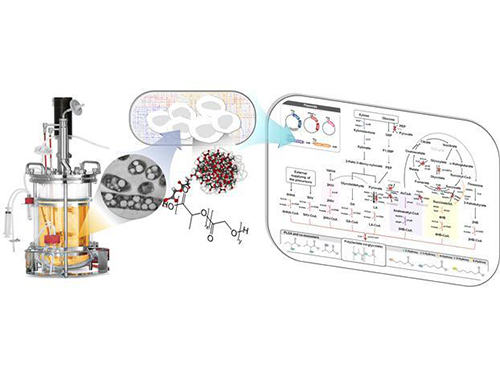 Top 10 Emerging Technologies by World Economic Forum
The World Economic Forum’s Meta-Council on Emerging Technologies announced its annual list of breakthrough technologies, the “Top 10 Emerging Technologies of 2016,” on June 23, 2016. The Meta-Council chose the top ten technologies based on the technologies’ potential to improve lives, transform industries, and safeguard the planet. The research field of systems metabolic engineering, founded by Distinguished Professor Sang Yup Lee of the Chemical and Biomolecular Engineering Department at KAIST, was also citied. Systems metabolic engineering, which combines elements of synthetic biology, systems biology, and evolutionary engineering, offers a sustainable process for the production of useful chemicals in an environmentally friendly way from plants such as inedible biomass, reducing the need of using fossil fuels. Details about the list follow below:
https://www.weforum.org/press/2016/06/battery-powered-villages-sociable-robots-rank-among-top-10-emerging-technologies-of-2016
The picture below shows the “systems metabolic engineering of E. coli for the production of PLGA." PLGA is poly(lactate-co-glycolate), which is widely used for biomedical applications, and has been made by chemical synthesis. Now it is possible to produce PLGA eco-friendly by one-step fermentation of a gut bacterium which is developed through systems metabolic engineering.
2016.06.27 View 11118
Top 10 Emerging Technologies by World Economic Forum
The World Economic Forum’s Meta-Council on Emerging Technologies announced its annual list of breakthrough technologies, the “Top 10 Emerging Technologies of 2016,” on June 23, 2016. The Meta-Council chose the top ten technologies based on the technologies’ potential to improve lives, transform industries, and safeguard the planet. The research field of systems metabolic engineering, founded by Distinguished Professor Sang Yup Lee of the Chemical and Biomolecular Engineering Department at KAIST, was also citied. Systems metabolic engineering, which combines elements of synthetic biology, systems biology, and evolutionary engineering, offers a sustainable process for the production of useful chemicals in an environmentally friendly way from plants such as inedible biomass, reducing the need of using fossil fuels. Details about the list follow below:
https://www.weforum.org/press/2016/06/battery-powered-villages-sociable-robots-rank-among-top-10-emerging-technologies-of-2016
The picture below shows the “systems metabolic engineering of E. coli for the production of PLGA." PLGA is poly(lactate-co-glycolate), which is widely used for biomedical applications, and has been made by chemical synthesis. Now it is possible to produce PLGA eco-friendly by one-step fermentation of a gut bacterium which is developed through systems metabolic engineering.
2016.06.27 View 11118 -
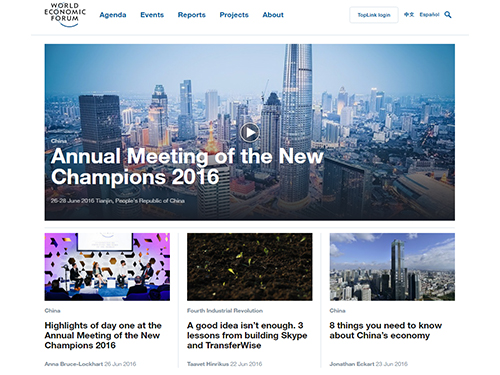 KAIST to Participate in Summer Davos Forum 2016 in China
A group of KAIST researchers will share their insights on the future and challenges of the current technological innovations impacting all aspects of society, while showcasing their research excellence in artificial intelligence and robotics.
Scientific and technological breakthroughs are more important than ever as key agents to drive social, economic, and political changes and advancements in today’s world. The World Economic Forum (WEF), an international organization that provides one of the broadest engagement platforms to address issues of major concern to the global community, will discuss the effects of these breakthroughs at its 10th Annual Meeting of the New Champions, a.k.a., the Summer Davos Forum, in Tianjin, China, June 26-28, 2016.
Three professors from the Korea Advanced Institute of Science and Technology (KAIST) will join the Annual Meeting and offer their expertise in the fields of biotechnology, artificial intelligence, and robotics to explore the conference theme, “The Fourth Industrial Revolution and Its Transformational Impact.” The Fourth Industrial Revolution, a term coined by WEF founder, Klaus Schwab, is characterized by a range of new technologies that fuse the physical, digital, and biological worlds, such as the Internet of Things, cloud computing, and automation.
Distinguished Professor Sang Yup Lee of the Chemical and Biomolecular Engineering Department will speak at the Experts Reception to be held on June 25, 2016 on the topic of “The Summer Davos Forum and Science and Technology in Asia.” On June 27, 2016, he will participate in two separate discussion sessions.
In the first session entitled “What If Drugs Are Printed from the Internet?,” Professor Lee will discuss the impacts of advancements in biotechnology and 3D printing technology on the future of medicine with Nita A. Farahany, a Duke University professor. Clare Matterson, the Director of Strategy at Wellcome Trust in the United Kingdom, will serve as the moderator. The discussants will note recent developments made in the way patients receive their medicine, for example, downloading drugs directly from the internet and the production of yeast strains to make opioids for pain treatment through systems metabolic engineering. They will also suggest how these emerging technologies will transform the landscape of the pharmaceutical industry in the years to come.
In the second session, “Lessons for Life,” Professor Lee will talk about how to nurture life-long learning and creativity to support personal and professional growth necessary in an era of the new industrial revolution.
During the Annual Meeting, Professors Jong-Hwan Kim of the Electrical Engineering School and David Hyunchul Shim of the Aerospace Department will host, together with researchers from Carnegie Mellon University and AnthroTronix, an engineering research and development company, a technological exhibition on robotics. Professor Kim, the founder of the internally renowned Robot World Cup, will showcase his humanoid soccer-playing micro-robots and display their various cutting-edge technologies such as imaging processing, artificial intelligence, walking, and balancing. Professor Shim will present a human-like robotic piloting system, PIBOT, which autonomously operates a simulated flight program by employing control sticks and guiding an airplane from takeoff to landing.
In addition, the two professors will join Professor Lee, who is also a moderator, to host a KAIST-led session on June 26, 2016, entitled “Science in Depth: From Deep Learning to Autonomous Machines.” Professors Kim and Shim will explore new opportunities and challenges in their fields from machine learning to autonomous robotics, including unmanned vehicles and drones.
Since 2011, KAIST has participated in the World Economic Forum’s two flagship conferences, the January and June Davos Forums, to introduce outstanding talents, share their latest research achievements, and interact with global leaders.
KAIST President Steve Kang said, “It is important for KAIST to be involved in global forums that identify issues critical to humanity and seek answers to solve them, and where our skills and knowledge in science and technology can play a meaningful role. The Annual Meeting in China will become another venue to accomplish this.”
2016.06.27 View 12651
KAIST to Participate in Summer Davos Forum 2016 in China
A group of KAIST researchers will share their insights on the future and challenges of the current technological innovations impacting all aspects of society, while showcasing their research excellence in artificial intelligence and robotics.
Scientific and technological breakthroughs are more important than ever as key agents to drive social, economic, and political changes and advancements in today’s world. The World Economic Forum (WEF), an international organization that provides one of the broadest engagement platforms to address issues of major concern to the global community, will discuss the effects of these breakthroughs at its 10th Annual Meeting of the New Champions, a.k.a., the Summer Davos Forum, in Tianjin, China, June 26-28, 2016.
Three professors from the Korea Advanced Institute of Science and Technology (KAIST) will join the Annual Meeting and offer their expertise in the fields of biotechnology, artificial intelligence, and robotics to explore the conference theme, “The Fourth Industrial Revolution and Its Transformational Impact.” The Fourth Industrial Revolution, a term coined by WEF founder, Klaus Schwab, is characterized by a range of new technologies that fuse the physical, digital, and biological worlds, such as the Internet of Things, cloud computing, and automation.
Distinguished Professor Sang Yup Lee of the Chemical and Biomolecular Engineering Department will speak at the Experts Reception to be held on June 25, 2016 on the topic of “The Summer Davos Forum and Science and Technology in Asia.” On June 27, 2016, he will participate in two separate discussion sessions.
In the first session entitled “What If Drugs Are Printed from the Internet?,” Professor Lee will discuss the impacts of advancements in biotechnology and 3D printing technology on the future of medicine with Nita A. Farahany, a Duke University professor. Clare Matterson, the Director of Strategy at Wellcome Trust in the United Kingdom, will serve as the moderator. The discussants will note recent developments made in the way patients receive their medicine, for example, downloading drugs directly from the internet and the production of yeast strains to make opioids for pain treatment through systems metabolic engineering. They will also suggest how these emerging technologies will transform the landscape of the pharmaceutical industry in the years to come.
In the second session, “Lessons for Life,” Professor Lee will talk about how to nurture life-long learning and creativity to support personal and professional growth necessary in an era of the new industrial revolution.
During the Annual Meeting, Professors Jong-Hwan Kim of the Electrical Engineering School and David Hyunchul Shim of the Aerospace Department will host, together with researchers from Carnegie Mellon University and AnthroTronix, an engineering research and development company, a technological exhibition on robotics. Professor Kim, the founder of the internally renowned Robot World Cup, will showcase his humanoid soccer-playing micro-robots and display their various cutting-edge technologies such as imaging processing, artificial intelligence, walking, and balancing. Professor Shim will present a human-like robotic piloting system, PIBOT, which autonomously operates a simulated flight program by employing control sticks and guiding an airplane from takeoff to landing.
In addition, the two professors will join Professor Lee, who is also a moderator, to host a KAIST-led session on June 26, 2016, entitled “Science in Depth: From Deep Learning to Autonomous Machines.” Professors Kim and Shim will explore new opportunities and challenges in their fields from machine learning to autonomous robotics, including unmanned vehicles and drones.
Since 2011, KAIST has participated in the World Economic Forum’s two flagship conferences, the January and June Davos Forums, to introduce outstanding talents, share their latest research achievements, and interact with global leaders.
KAIST President Steve Kang said, “It is important for KAIST to be involved in global forums that identify issues critical to humanity and seek answers to solve them, and where our skills and knowledge in science and technology can play a meaningful role. The Annual Meeting in China will become another venue to accomplish this.”
2016.06.27 View 12651 -
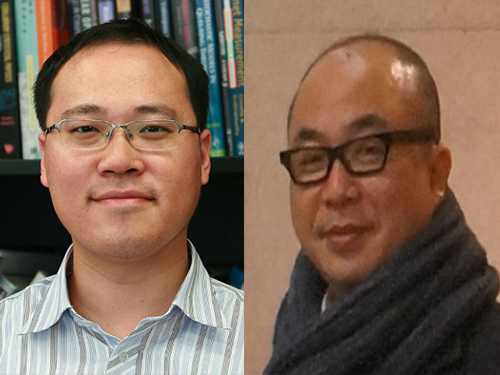 KAIST Researchers Receive the 2016 IEEE William R. Bennett Prize
A research team led by Professors Yung Yi and Song Chong from the Electrical Engineering Department at KAIST has been awarded the 2016 William R. Bennett Prize of the Institute of Electrical and Electronics Engineers (IEEE), which is the most prestigious award in the field of communications network. The IEEE bestows the honor annually and selects winning papers from among those published in the past three years for its quality, originality, scientific citation index, and peer reviews.
The IEEE award ceremony will take place on May 24, 2016 at the IEEE International Conference on Communications in Kuala Lumpur, Malaysia.
The team members include Dr. Kyoung-Han Lee, a KAIST graduate, who is currently a professor at Ulsan National Institute of Science and Technology (UNIST) in Korea, Dr. Joo-Hyun Lee, a postdoctoral researcher at Ohio State University in the United States, and In-Jong Rhee, a vice president of the Mobile Division at Samsung Electronics. The same KAIST team previously received the award back in 2013, making them the second recipient ever to win the IEEE William R. Bennett Prize twice.
Past winners include Professors Robert Gallager of the Massachusetts Institute of Technology (MIT), Sachin Katti of Stanford University, and Ion Stoica of the University of California at Berkeley.
The research team received the Bennett award for their work on “Mobile Data Offloading: How Much Can WiFi Deliver?” Their research paper has been cited more than 500 times since its publication in 2013. They proposed an original method to effectively offload the cellular network and maximize the Wi-Fi network usage by analyzing the pattern of individual human mobility in daily life.
2016.05.02 View 13671
KAIST Researchers Receive the 2016 IEEE William R. Bennett Prize
A research team led by Professors Yung Yi and Song Chong from the Electrical Engineering Department at KAIST has been awarded the 2016 William R. Bennett Prize of the Institute of Electrical and Electronics Engineers (IEEE), which is the most prestigious award in the field of communications network. The IEEE bestows the honor annually and selects winning papers from among those published in the past three years for its quality, originality, scientific citation index, and peer reviews.
The IEEE award ceremony will take place on May 24, 2016 at the IEEE International Conference on Communications in Kuala Lumpur, Malaysia.
The team members include Dr. Kyoung-Han Lee, a KAIST graduate, who is currently a professor at Ulsan National Institute of Science and Technology (UNIST) in Korea, Dr. Joo-Hyun Lee, a postdoctoral researcher at Ohio State University in the United States, and In-Jong Rhee, a vice president of the Mobile Division at Samsung Electronics. The same KAIST team previously received the award back in 2013, making them the second recipient ever to win the IEEE William R. Bennett Prize twice.
Past winners include Professors Robert Gallager of the Massachusetts Institute of Technology (MIT), Sachin Katti of Stanford University, and Ion Stoica of the University of California at Berkeley.
The research team received the Bennett award for their work on “Mobile Data Offloading: How Much Can WiFi Deliver?” Their research paper has been cited more than 500 times since its publication in 2013. They proposed an original method to effectively offload the cellular network and maximize the Wi-Fi network usage by analyzing the pattern of individual human mobility in daily life.
2016.05.02 View 13671 -
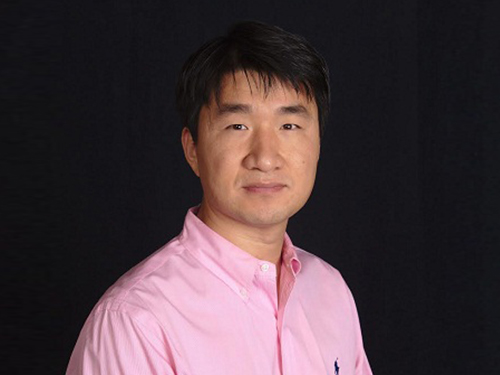 KAIST Graduate Han Receives a 2016 PECASE Award
President Barack Obama of the United States (US) announced 105 recipients of the 2016 Presidential Early Career Awards for Scientists and Engineers (PECASE) on February 18. Among the awardees was a graduate from the Department of Electrical Engineering at KAIST.
Dr. Jin-Woo Han has worked as a research scientist at the National Aeronautics and Space Administration (NASA) Ames Research Center since graduating from KAIST in 2010. This year, he is the only awardee who received a doctoral degree from a Korean university to become a recipient of the highest honor bestowed by the US government on science and engineering professionals in the early stages of their independent research careers.
The awards ceremony will take place in early spring at the White House in Washington, D.C.
Dr. Han has been involved in the development of radiation tolerant semiconductor devices as well as radiation and gas sensors under Dr. Meyya Meyyappan, Chief Scientist of the Center for Nanotechnology at NASA Ames Research Center.
KAIST and the NASA Ames Research Center made a research collaboration agreement in 2008, under which KAIST has sent 12 post-doctoral fellows to the center to date.
The PECASE awards, established in 1996 by President Bill Clinton, are coordinated by the Office of Science and Technology Policy within the Executive Office of the US President. Awardees are selected for their pursuit of innovative research at the frontiers of science and technology and their commitment to community services as demonstrated through scientific leadership, public education, or community outreach.
2016.02.23 View 9868
KAIST Graduate Han Receives a 2016 PECASE Award
President Barack Obama of the United States (US) announced 105 recipients of the 2016 Presidential Early Career Awards for Scientists and Engineers (PECASE) on February 18. Among the awardees was a graduate from the Department of Electrical Engineering at KAIST.
Dr. Jin-Woo Han has worked as a research scientist at the National Aeronautics and Space Administration (NASA) Ames Research Center since graduating from KAIST in 2010. This year, he is the only awardee who received a doctoral degree from a Korean university to become a recipient of the highest honor bestowed by the US government on science and engineering professionals in the early stages of their independent research careers.
The awards ceremony will take place in early spring at the White House in Washington, D.C.
Dr. Han has been involved in the development of radiation tolerant semiconductor devices as well as radiation and gas sensors under Dr. Meyya Meyyappan, Chief Scientist of the Center for Nanotechnology at NASA Ames Research Center.
KAIST and the NASA Ames Research Center made a research collaboration agreement in 2008, under which KAIST has sent 12 post-doctoral fellows to the center to date.
The PECASE awards, established in 1996 by President Bill Clinton, are coordinated by the Office of Science and Technology Policy within the Executive Office of the US President. Awardees are selected for their pursuit of innovative research at the frontiers of science and technology and their commitment to community services as demonstrated through scientific leadership, public education, or community outreach.
2016.02.23 View 9868 -
 Workshop on Techniques in Prediction Analysis for the Industry
There has been growing interest in the value and the application of “big data” in recent years. To meet this interest, a workshop was held to discuss the possibility and the future of prediction analysis, which is the next big step in data mining after big data.
On February 25 in COEX, Seoul, the Department of Knowledge Service Engineering at KAIST held the 4th knowledge service workshop on “Techniques in Prediction Analysis for the Industry.”
Predication analysis is a technique that can predict the future based on the understanding of the past and the present through analyzing “big data.” If “big data” is fuel in figurative sense, the prediction analysis serves as the engine.
The Department seeks to help those companies interested in data mining by introducing fundamentals and some application examples to the executives of companies who are interested in implementation of the technique.
The lecture was delivered by six professors from the Department of Knowledge Service Engineering and the Department of Industrial and Systems Engineering at KAIST.
Thomas Miller, the author of Modeling Techniques in Predictive Analytics, covered the contents of his book at the event. Professor Moon-Yong Yi, Chair of the Department of Knowledge Service Engineering, said, “This conference will be important to companies that are considering the implementation of the prediction analysis as well as to students who are interested in the field.”
2016.02.22 View 5363
Workshop on Techniques in Prediction Analysis for the Industry
There has been growing interest in the value and the application of “big data” in recent years. To meet this interest, a workshop was held to discuss the possibility and the future of prediction analysis, which is the next big step in data mining after big data.
On February 25 in COEX, Seoul, the Department of Knowledge Service Engineering at KAIST held the 4th knowledge service workshop on “Techniques in Prediction Analysis for the Industry.”
Predication analysis is a technique that can predict the future based on the understanding of the past and the present through analyzing “big data.” If “big data” is fuel in figurative sense, the prediction analysis serves as the engine.
The Department seeks to help those companies interested in data mining by introducing fundamentals and some application examples to the executives of companies who are interested in implementation of the technique.
The lecture was delivered by six professors from the Department of Knowledge Service Engineering and the Department of Industrial and Systems Engineering at KAIST.
Thomas Miller, the author of Modeling Techniques in Predictive Analytics, covered the contents of his book at the event. Professor Moon-Yong Yi, Chair of the Department of Knowledge Service Engineering, said, “This conference will be important to companies that are considering the implementation of the prediction analysis as well as to students who are interested in the field.”
2016.02.22 View 5363 -
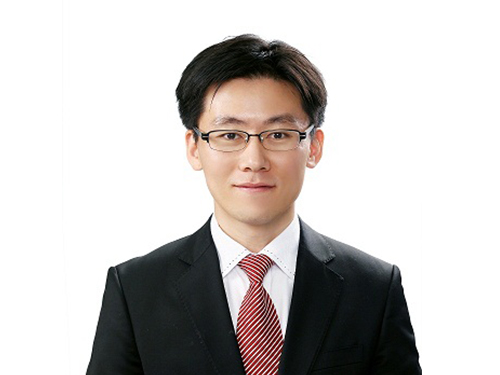 GSIS Graduates Its First Doctor
The Graduate School of Information Security at KAIST (GSIS) granted its first doctoral degree to Il-Goo Lee at the university’s 2016 commencement on February 19, 2016.
Lee received the degree for his dissertation entitled “Interference-Aware Secure Communications for Wireless LANs.”
He explained the background of his research:
“As we use wireless technology more and more in areas of the Internet of Things (IoT), unmanned vehicles, and drones, information security will become an issue of major concern. I would like to contribute to the advancement of communications technology to help minimize wireless interference between devices while ensuring their optimal performance.”
Based on his research, he developed a communications technique to increase wireless devices’ energy efficiency and the level of their security, and created a prototype to showcase that technique.
He plans to continue his research in the development of the next generation WiFi chip sets to protect the information security of IoT and wireless devices.
Since its establishment in March 2011, KAIST’s GSIS has conferred 50 master’s and one doctoral degrees.
2016.02.18 View 9235
GSIS Graduates Its First Doctor
The Graduate School of Information Security at KAIST (GSIS) granted its first doctoral degree to Il-Goo Lee at the university’s 2016 commencement on February 19, 2016.
Lee received the degree for his dissertation entitled “Interference-Aware Secure Communications for Wireless LANs.”
He explained the background of his research:
“As we use wireless technology more and more in areas of the Internet of Things (IoT), unmanned vehicles, and drones, information security will become an issue of major concern. I would like to contribute to the advancement of communications technology to help minimize wireless interference between devices while ensuring their optimal performance.”
Based on his research, he developed a communications technique to increase wireless devices’ energy efficiency and the level of their security, and created a prototype to showcase that technique.
He plans to continue his research in the development of the next generation WiFi chip sets to protect the information security of IoT and wireless devices.
Since its establishment in March 2011, KAIST’s GSIS has conferred 50 master’s and one doctoral degrees.
2016.02.18 View 9235 -
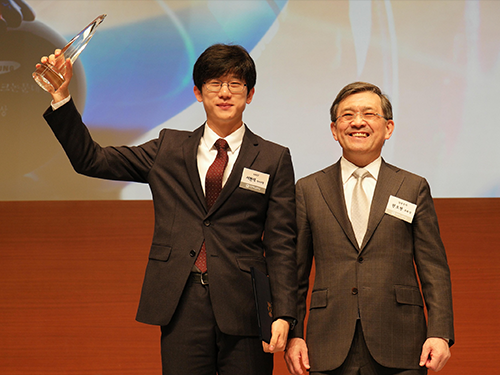 Ph.D. Candidate Seo Wins the Human Tech Paper Award
Hyun-Suk Seo, a doctoral student of KAIST’s Department of Electrical Engineering, received the grand prize of the “22nd Human Tech Paper Award” on February 3, 2016 from Samsung Electronics Co., Ltd.
Seo was the first to receive this prize ever since the Human Tech Paper Award was established 22 years ago. Until last year, the highest prize awarded for KAIST was a gold one.
The “Human Tech Paper Award” was established in 1994 by Samsung Electronics to discover and support outstanding scientists in the field of electrical engineering.
Entitled “Self-Gated Cardiac Cine MRI Using Phase Information,” Seo’s paper presented a technology that would reduce discomforts and inconveniences experienced by patients who take a magnetic resonance imaging (MRI).
This technology uses the speed changes of aorta and the abdominal movements of body to obtain the phase changes of magnetic resonance signals so that MRIs may be taken despite the organs’ movements.
Seo commented on his research, “I wanted to develop a technique that can make MRI a more comfortable experience. I will continue my research on this subject and hope to serve the needs of the society.”
In addition, the “Special Award,” which is given to schools, was awarded to KAIST. KAIST’s Department of Electrical Engineering has also been named the department that has received the second most awards (15 awards) this year.
Oh-Hyun Kwon, Vice President of Samsung Electronics, Steve Kang, President of KAIST, and Nak-In Seo, President of Seoul National University, participated in the event.
Picture: Hyun-Suk Seo (left), the recipient of the grand prize of the 2016 Human Tech Paper Award, and Oh-Hyun Kwon (right), Vice President of Samsung Electronics
2016.02.06 View 9236
Ph.D. Candidate Seo Wins the Human Tech Paper Award
Hyun-Suk Seo, a doctoral student of KAIST’s Department of Electrical Engineering, received the grand prize of the “22nd Human Tech Paper Award” on February 3, 2016 from Samsung Electronics Co., Ltd.
Seo was the first to receive this prize ever since the Human Tech Paper Award was established 22 years ago. Until last year, the highest prize awarded for KAIST was a gold one.
The “Human Tech Paper Award” was established in 1994 by Samsung Electronics to discover and support outstanding scientists in the field of electrical engineering.
Entitled “Self-Gated Cardiac Cine MRI Using Phase Information,” Seo’s paper presented a technology that would reduce discomforts and inconveniences experienced by patients who take a magnetic resonance imaging (MRI).
This technology uses the speed changes of aorta and the abdominal movements of body to obtain the phase changes of magnetic resonance signals so that MRIs may be taken despite the organs’ movements.
Seo commented on his research, “I wanted to develop a technique that can make MRI a more comfortable experience. I will continue my research on this subject and hope to serve the needs of the society.”
In addition, the “Special Award,” which is given to schools, was awarded to KAIST. KAIST’s Department of Electrical Engineering has also been named the department that has received the second most awards (15 awards) this year.
Oh-Hyun Kwon, Vice President of Samsung Electronics, Steve Kang, President of KAIST, and Nak-In Seo, President of Seoul National University, participated in the event.
Picture: Hyun-Suk Seo (left), the recipient of the grand prize of the 2016 Human Tech Paper Award, and Oh-Hyun Kwon (right), Vice President of Samsung Electronics
2016.02.06 View 9236 -
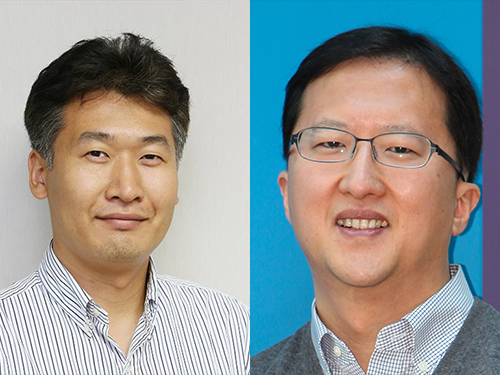 Professors Jeon and Choi Receive the Young Scientist Award
Professors Seokwoo Jeon of the Department of Materials Science and Engineering and Jang Wook Choi of the Graduate School of Energy, Environment, Water and Sustainability (EEWS) at KAIST received the Young Scientist Award.
The award ceremony took place at the Korea Press Center in Seoul. Presented by the Ministry of Science, ICT and Future Planning of Korea and the National Academy of Engineering of Korea, the Young Scientist Award is given to outstanding scientists under the age of 40 who have demonstrated excellence in their research in the field of natural science.
Each year the award is given to three scientists in different areas.
Professor Jeon was recognized for his achievement in creating a new property of materials. He studied synthesis and development of low-dimensional nanomaterials and developed a large area nanostructure.
Professor Choi’s research area was to discover optimal materials for rechargeable batteries. By applying his research, he developed rechargeable batteries with high efficiency, making the wearable system more feasible.
2016.01.11 View 12143
Professors Jeon and Choi Receive the Young Scientist Award
Professors Seokwoo Jeon of the Department of Materials Science and Engineering and Jang Wook Choi of the Graduate School of Energy, Environment, Water and Sustainability (EEWS) at KAIST received the Young Scientist Award.
The award ceremony took place at the Korea Press Center in Seoul. Presented by the Ministry of Science, ICT and Future Planning of Korea and the National Academy of Engineering of Korea, the Young Scientist Award is given to outstanding scientists under the age of 40 who have demonstrated excellence in their research in the field of natural science.
Each year the award is given to three scientists in different areas.
Professor Jeon was recognized for his achievement in creating a new property of materials. He studied synthesis and development of low-dimensional nanomaterials and developed a large area nanostructure.
Professor Choi’s research area was to discover optimal materials for rechargeable batteries. By applying his research, he developed rechargeable batteries with high efficiency, making the wearable system more feasible.
2016.01.11 View 12143 -
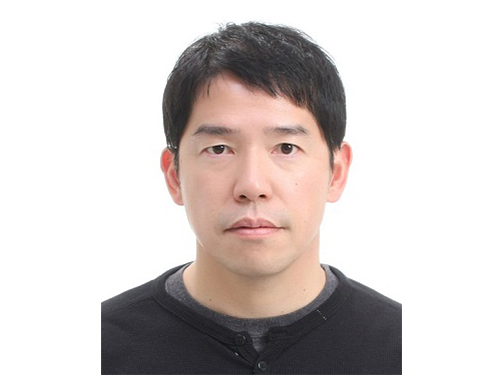 Professor Naehyuck Chang Appointed a 2015 Fellow by the ACM
The Association for Computing Machinery (ACM), the world’s largest educational and scientific computing society, released a list of its new fellows on December 8, 2015, the 2015 ACM Fellows.
Professor Naehyuck Chang of the School of Electrical Engineering at KAIST was among the 42 new members who became ACM Fellows in recognition of their contributions to the development and application of computing in areas from data management and spoken-language processing to robotics and cryptography.
Professor Chang is known for his leading research in power and energy optimization from embedded systems applications to large-scale energy systems such as device- and system-level power and energy measurement and estimation, liquid crystal display power reduction, dynamic voltage scaling, hybrid electrical energy storage systems, and photovoltaic cell arrays. He is the fourth Korean to be nominated an ACM Fellow.
Professor Chang is also a Fellow of the Institute of Electrical and Electronics Engineers (IEEE) and the Editor-in-Chief of the journal, ACM Transactions on Design Automation of Electronic Systems (TODAES). He served as the President of the ACM Special Interest Group on Design Automation in 2012.
Additional information about the ACM 2015 Fellows, go to http://www.acm.org/press-room/news-releases/2015/fellows-2015:
2015.12.11 View 9669
Professor Naehyuck Chang Appointed a 2015 Fellow by the ACM
The Association for Computing Machinery (ACM), the world’s largest educational and scientific computing society, released a list of its new fellows on December 8, 2015, the 2015 ACM Fellows.
Professor Naehyuck Chang of the School of Electrical Engineering at KAIST was among the 42 new members who became ACM Fellows in recognition of their contributions to the development and application of computing in areas from data management and spoken-language processing to robotics and cryptography.
Professor Chang is known for his leading research in power and energy optimization from embedded systems applications to large-scale energy systems such as device- and system-level power and energy measurement and estimation, liquid crystal display power reduction, dynamic voltage scaling, hybrid electrical energy storage systems, and photovoltaic cell arrays. He is the fourth Korean to be nominated an ACM Fellow.
Professor Chang is also a Fellow of the Institute of Electrical and Electronics Engineers (IEEE) and the Editor-in-Chief of the journal, ACM Transactions on Design Automation of Electronic Systems (TODAES). He served as the President of the ACM Special Interest Group on Design Automation in 2012.
Additional information about the ACM 2015 Fellows, go to http://www.acm.org/press-room/news-releases/2015/fellows-2015:
2015.12.11 View 9669 -
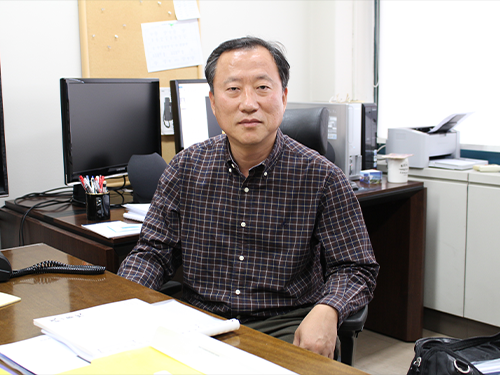 Professor Tae-Eog Lee Receives December's Scientist of the Month Award by the Korean Government
Professor Tae-Eog Lee of the Industrial and Systems Engineering at KAIST received the Scientist of the Month Award for December 2015. The award is sponsored by the Ministry of Science, ICT and Future Planning of Korea, which was hosted by the National Research Foundation of Korea.
The award recognizes Professor Lee’s efforts to advance the field of semiconductor device fabrication processing. This includes the development of the most efficient scheduling and controlling of cluster tools. He also created mathematical solutions to optimize the complicated cycle time of cluster tools in semiconductor manufacturing and the process of robot task workload.
Professor Lee contributed to the formation of various discrete event systems and automation systems based on his mathematical theories and solutions and advanced a scheduling technology for the automation of semiconductor production.
He has published 18 research papers in the past three years and has pioneered to develop Korean tool schedulers through the private sector-university cooperation.
2015.12.10 View 7762
Professor Tae-Eog Lee Receives December's Scientist of the Month Award by the Korean Government
Professor Tae-Eog Lee of the Industrial and Systems Engineering at KAIST received the Scientist of the Month Award for December 2015. The award is sponsored by the Ministry of Science, ICT and Future Planning of Korea, which was hosted by the National Research Foundation of Korea.
The award recognizes Professor Lee’s efforts to advance the field of semiconductor device fabrication processing. This includes the development of the most efficient scheduling and controlling of cluster tools. He also created mathematical solutions to optimize the complicated cycle time of cluster tools in semiconductor manufacturing and the process of robot task workload.
Professor Lee contributed to the formation of various discrete event systems and automation systems based on his mathematical theories and solutions and advanced a scheduling technology for the automation of semiconductor production.
He has published 18 research papers in the past three years and has pioneered to develop Korean tool schedulers through the private sector-university cooperation.
2015.12.10 View 7762 -
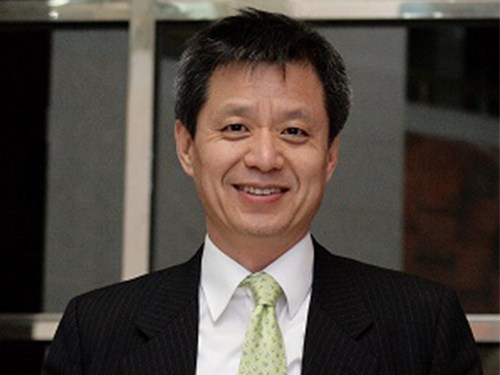 Professor Duck-Joo Lee Receives the Achievement Award in the Asian-Australian Rotorcraft Forum 2015
Professor Duck-Joo Lee of the Aerospace Engineering Department at KAIST received the achievement award in ARF (Asian-Australian Rotorcraft Forum) 2015. In ARF, companies such as Bell Helicopter and Airbus Helicopter gather and share their technological discoveries.
Professor Lee was elected as Chairman of the first ARF to oversee the organization of its forum as well as exhibitions, and his effort towards advancing rotorcraft was recognized.
Professor Lee said, “I hope that research findings of many scholars will be applied to the domestic air transportation businesses.” He added, “More companies in the field should enter the global market.”
Professor Lee started his career as a researcher in NASA Ames Research Center. He is an expert in the fields of jet engines and aeroacoustics.
2015.12.08 View 7112
Professor Duck-Joo Lee Receives the Achievement Award in the Asian-Australian Rotorcraft Forum 2015
Professor Duck-Joo Lee of the Aerospace Engineering Department at KAIST received the achievement award in ARF (Asian-Australian Rotorcraft Forum) 2015. In ARF, companies such as Bell Helicopter and Airbus Helicopter gather and share their technological discoveries.
Professor Lee was elected as Chairman of the first ARF to oversee the organization of its forum as well as exhibitions, and his effort towards advancing rotorcraft was recognized.
Professor Lee said, “I hope that research findings of many scholars will be applied to the domestic air transportation businesses.” He added, “More companies in the field should enter the global market.”
Professor Lee started his career as a researcher in NASA Ames Research Center. He is an expert in the fields of jet engines and aeroacoustics.
2015.12.08 View 7112 -
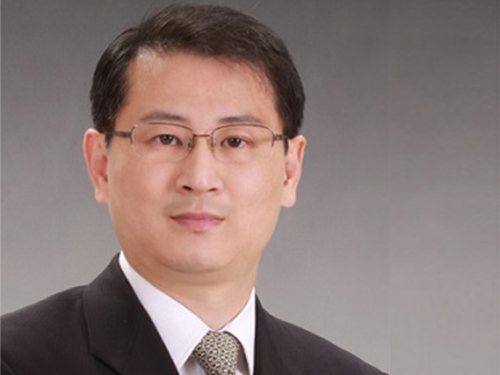 Professor Keon-Jae Lee Lectures at IEDM and ISSCC Forums
Professor Keon-Jae Lee of KAIST’s Materials Science and Engineering Department delivered a speech at the 2015 Institute of Electrical and Electronics Engineers (IEEE) International Electron Devices Meeting (IEDM) held on December 7-9, 2015 in Washington, D.C.
He will also present a speech at the 2016 International Solid-State Circuits Conference scheduled on January 31-February 4, 2016 in San Francisco, California.
Both professional gatherings are considered the world’s most renowned forums in electronic devices and semiconductor technology. It is rare for a Korean researcher to be invited to speak at these global conferences.
Professor Lee was recognized for his research on flexible NAND chips. The Korea Times, an English language daily newspaper in Korea, reported on his participation in the forums and his recent work. An excerpt of the article follows below:
“KAIST Professor to Lecture at Renowned Tech Forums”
By Lee Min-hyung, The Korea Times, November 26, 2015
Recently he has focused on delivering technologies for producing flexible materials that can be applied to everyday life. The flexible NAND flash memory chips are expected to be widely used for developing flexible handsets. His latest research also includes flexible light-emitting diodes (LED) for implantable biomedical applications.
Lee is currently running a special laboratory focused on developing new flexible nano-materials. The research group is working to develop what it calls “self-powered flexible electronic systems” using nanomaterials and electronic technology.
Lee’s achievement with flexible NAND chips was published in the October edition of Nano Letters, the renowned U.S.-based scientific journal.
He said that flexible memory chips will be used to develop wearable computers that can be installed anywhere.
2015.11.26 View 11545
Professor Keon-Jae Lee Lectures at IEDM and ISSCC Forums
Professor Keon-Jae Lee of KAIST’s Materials Science and Engineering Department delivered a speech at the 2015 Institute of Electrical and Electronics Engineers (IEEE) International Electron Devices Meeting (IEDM) held on December 7-9, 2015 in Washington, D.C.
He will also present a speech at the 2016 International Solid-State Circuits Conference scheduled on January 31-February 4, 2016 in San Francisco, California.
Both professional gatherings are considered the world’s most renowned forums in electronic devices and semiconductor technology. It is rare for a Korean researcher to be invited to speak at these global conferences.
Professor Lee was recognized for his research on flexible NAND chips. The Korea Times, an English language daily newspaper in Korea, reported on his participation in the forums and his recent work. An excerpt of the article follows below:
“KAIST Professor to Lecture at Renowned Tech Forums”
By Lee Min-hyung, The Korea Times, November 26, 2015
Recently he has focused on delivering technologies for producing flexible materials that can be applied to everyday life. The flexible NAND flash memory chips are expected to be widely used for developing flexible handsets. His latest research also includes flexible light-emitting diodes (LED) for implantable biomedical applications.
Lee is currently running a special laboratory focused on developing new flexible nano-materials. The research group is working to develop what it calls “self-powered flexible electronic systems” using nanomaterials and electronic technology.
Lee’s achievement with flexible NAND chips was published in the October edition of Nano Letters, the renowned U.S.-based scientific journal.
He said that flexible memory chips will be used to develop wearable computers that can be installed anywhere.
2015.11.26 View 11545